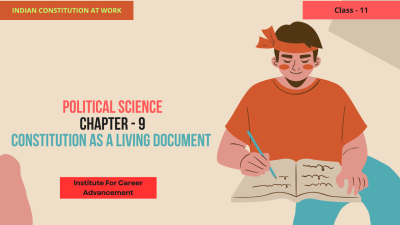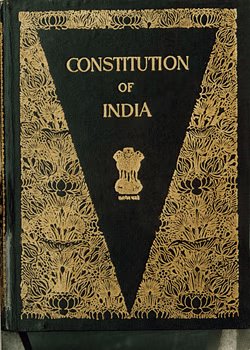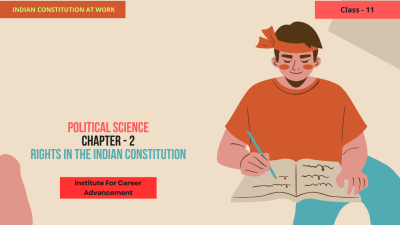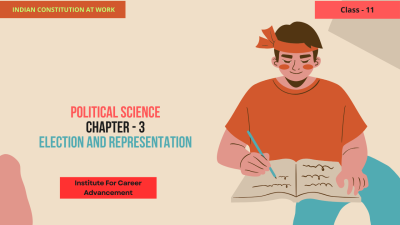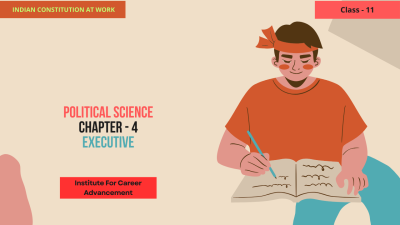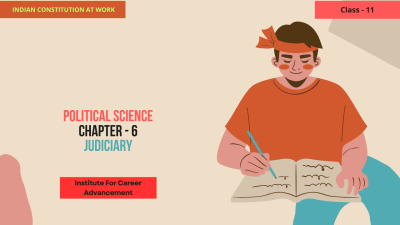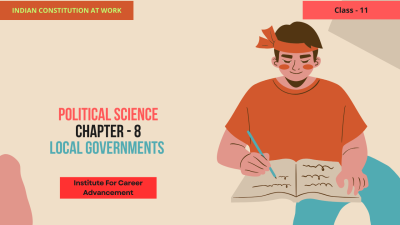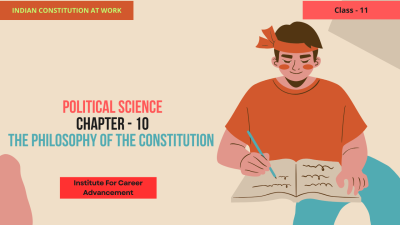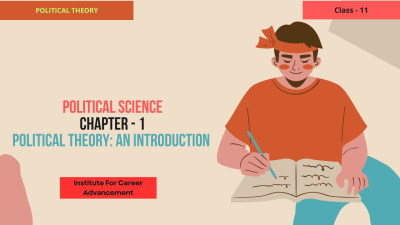Constitution as a Living Document - Class 11
The Constitution as a Living Document is a concept that emphasizes the adaptability and flexibility of a constitution to evolve and change over time, reflecting the changing needs and values of society. This means that the constitution is not a static document but rather a dynamic one that can be interpreted and applied in different ways to address contemporary challenges. Key characteristics of a living document: Adaptability: The constitution can be amended or interpreted to accommodate new developments and changing circumstances. Flexibility: It allows for flexibility in application, enabling it to adapt to different contexts and situations. Relevance: The constitution remains relevant and meaningful to society even as time passes. Growth: It can grow and evolve over time, reflecting the changing values and aspirations of the people. Examples of the constitution as a living document: Constitutional amendments: Many countries have amended their constitutions to address new issues or reflect changing values. For example, the United States has amended its Constitution 27 times since its ratification. Judicial interpretation: Courts can interpret the constitution in different ways, adapting it to new circumstances and challenges. For example, the Supreme Court of India has played a significant role in interpreting and evolving the Indian Constitution. Social and cultural changes: The constitution can reflect social and cultural changes, such as changes in gender roles, technology, and economic conditions. Importance of the constitution as a living document: Adaptability to changing times: It allows the constitution to remain relevant and effective in a rapidly changing world. Flexibility in application: It enables the constitution to be applied in different contexts and situations. Growth and development: It allows the constitution to grow and evolve over time, reflecting the changing needs and aspirations of the people. Democratic values: It upholds democratic values by allowing the constitution to adapt to the changing needs and values of the people. Accountability: It holds the government accountable to the people by ensuring that the constitution is interpreted and applied in a way that reflects their values and aspirations. জীবন্ত দলিল হিসাবে সংবিধান এমন একটি ধারণা যা সমাজের পরিবর্তিত চাহিদা এবং মূল্যবোধকে প্রতিফলিত করে সময়ের সাথে সাথে বিবর্তিত এবং পরিবর্তিত হওয়ার জন্য একটি সংবিধানের অভিযোজনযোগ্যতা এবং নমনীয়তার উপর জোর দেয়। এর অর্থ হল সংবিধান কোনও স্থির নথি নয়, বরং একটি গতিশীল নথি যা সমসাময়িক চ্যালেঞ্জগুলি মোকাবেলায় বিভিন্ন উপায়ে ব্যাখ্যা ও প্রয়োগ করা যেতে পারে। একটি জীবন্ত নথির মূল বৈশিষ্ট্যগুলিঃ অভিযোজনযোগ্যতাঃ নতুন উন্নয়ন এবং পরিবর্তিত পরিস্থিতির সঙ্গে সামঞ্জস্য রেখে সংবিধান সংশোধন বা ব্যাখ্যা করা যেতে পারে। নমনীয়তাঃ এটি প্রয়োগের ক্ষেত্রে নমনীয়তার অনুমতি দেয়, এটি বিভিন্ন প্রসঙ্গ এবং পরিস্থিতির সাথে খাপ খাইয়ে নিতে সক্ষম করে। প্রাসঙ্গিকতাঃ সময়ের সঙ্গে সঙ্গে সংবিধান সমাজের জন্য প্রাসঙ্গিক এবং অর্থপূর্ণ থেকে যায়। বৃদ্ধিঃ এটি সময়ের সাথে সাথে বৃদ্ধি এবং বিবর্তিত হতে পারে, যা মানুষের পরিবর্তিত মূল্যবোধ এবং আকাঙ্ক্ষাকে প্রতিফলিত করে। জীবন্ত দলিল হিসাবে সংবিধানের উদাহরণঃ সাংবিধানিক সংশোধনীঃ অনেক দেশ নতুন সমস্যা সমাধান বা পরিবর্তিত মূল্যবোধ প্রতিফলিত করার জন্য তাদের সংবিধান সংশোধন করেছে। উদাহরণস্বরূপ, মার্কিন যুক্তরাষ্ট্র তার অনুমোদনের পর থেকে 27 বার তার সংবিধান সংশোধন করেছে। বিচার বিভাগীয় ব্যাখ্যাঃ আদালত সংবিধানকে বিভিন্ন উপায়ে ব্যাখ্যা করতে পারে, নতুন পরিস্থিতি ও চ্যালেঞ্জের সঙ্গে খাপ খাইয়ে নিতে পারে। উদাহরণস্বরূপ, ভারতের সুপ্রিম কোর্ট ভারতীয় সংবিধানের ব্যাখ্যা ও বিকাশে গুরুত্বপূর্ণ ভূমিকা পালন করেছে। সামাজিক ও সাংস্কৃতিক পরিবর্তনঃ সংবিধান লিঙ্গ ভূমিকা, প্রযুক্তি এবং অর্থনৈতিক অবস্থার পরিবর্তনের মতো সামাজিক ও সাংস্কৃতিক পরিবর্তনগুলি প্রতিফলিত করতে পারে। জীবন্ত দলিল হিসেবে সংবিধানের গুরুত্বঃ পরিবর্তিত সময়ের সঙ্গে খাপ খাইয়ে নেওয়াঃ এটি সংবিধানকে দ্রুত পরিবর্তিত বিশ্বে প্রাসঙ্গিক এবং কার্যকর থাকার অনুমতি দেয়। প্রয়োগের নমনীয়তাঃ এটি সংবিধানকে বিভিন্ন প্রসঙ্গে এবং পরিস্থিতিতে প্রয়োগ করতে সক্ষম করে। বৃদ্ধি এবং উন্নয়নঃ এটি সংবিধানকে সময়ের সাথে সাথে বৃদ্ধি এবং বিবর্তিত হতে দেয়, যা জনগণের পরিবর্তিত চাহিদা এবং আকাঙ্ক্ষাকে প্রতিফলিত করে। গণতান্ত্রিক মূল্যবোধঃ এটি সংবিধানকে জনগণের পরিবর্তিত চাহিদা ও মূল্যবোধের সঙ্গে খাপ খাইয়ে নেওয়ার অনুমতি দিয়ে গণতান্ত্রিক মূল্যবোধকে সমর্থন করে। জবাবদিহিতাঃ সংবিধানের ব্যাখ্যা ও প্রয়োগ যাতে জনগণের মূল্যবোধ ও আকাঙ্ক্ষার প্রতিফলন ঘটায়, তা নিশ্চিত করে সরকারকে জনগণের কাছে জবাবদিহি করতে হয়।
English
Last updated
Wed, 27-Nov-2024

